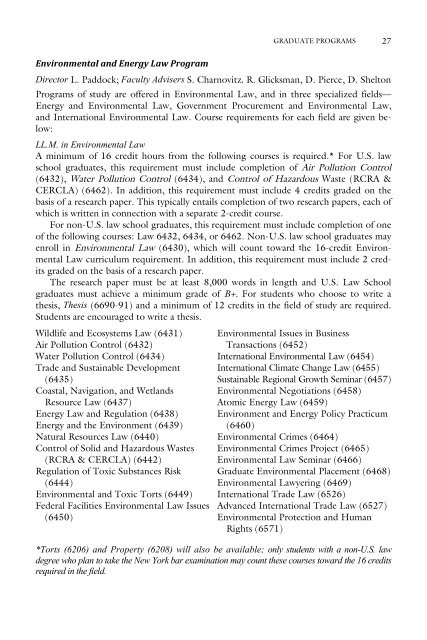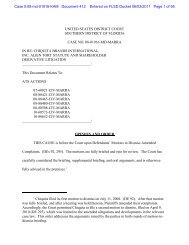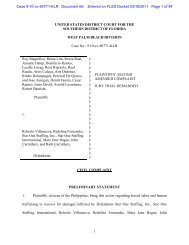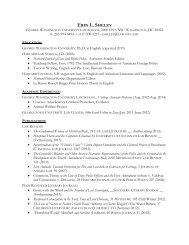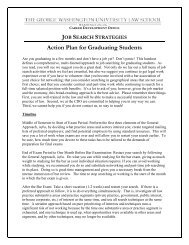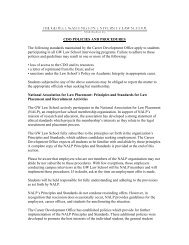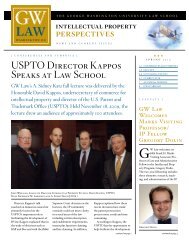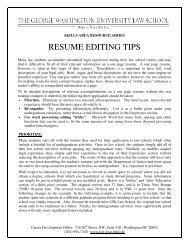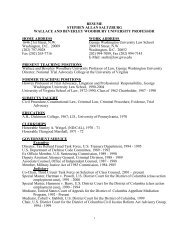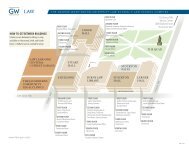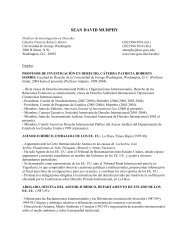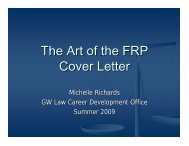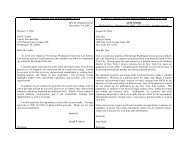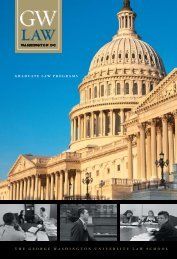The Bulletin - George Washington University Law School
The Bulletin - George Washington University Law School
The Bulletin - George Washington University Law School
- No tags were found...
Create successful ePaper yourself
Turn your PDF publications into a flip-book with our unique Google optimized e-Paper software.
GRADUATE PROGRAMS 27Environmental and Energy <strong>Law</strong> ProgramDirector L. Paddock; Faculty Advisers S. Charnovitz, R. Glicksman, D. Pierce, D. SheltonPrograms of study are offered in Environmental <strong>Law</strong>, and in three specialized fields—Energy and Environmental <strong>Law</strong>, Government Procurement and Environmental <strong>Law</strong>,and International Environmental <strong>Law</strong>. Course requirements for each field are given below:LL.M. in Environmental <strong>Law</strong>A minimum of 16 credit hours from the following courses is required.* For U.S. lawschool graduates, this requirement must include completion of Air Pollution Control(6432), Water Pollution Control (6434), and Control of Hazardous Waste (RCRA &CERCLA) (6462). In addition, this requirement must include 4 credits graded on thebasis of a research paper. This typically entails completion of two research papers, each ofwhich is written in connection with a separate 2-credit course.For non-U.S. law school graduates, this requirement must include completion of oneof the following courses: <strong>Law</strong> 6432, 6434, or 6462. Non-U.S. law school graduates mayenroll in Environmental <strong>Law</strong> (6430), which will count toward the 16-credit Environmental<strong>Law</strong> curriculum requirement. In addition, this requirement must include 2 creditsgraded on the basis of a research paper.<strong>The</strong> research paper must be at least 8,000 words in length and U.S. <strong>Law</strong> <strong>School</strong>graduates must achieve a minimum grade of B+. For students who choose to write athesis, <strong>The</strong>sis (6690-91) and a minimum of 12 credits in the field of study are required.Students are encouraged to write a thesis.Wildlife and Ecosystems <strong>Law</strong> (6431)Air Pollution Control (6432)Water Pollution Control (6434)Trade and Sustainable Development(6435)Coastal, Navigation, and WetlandsResource <strong>Law</strong> (6437)Energy <strong>Law</strong> and Regulation (6438)Energy and the Environment (6439)Natural Resources <strong>Law</strong> (6440)Control of Solid and Hazardous Wastes(RCRA & CERCLA) (6442)Regulation of Toxic Substances Risk(6444)Environmental and Toxic Torts (6449)Federal Facilities Environmental <strong>Law</strong> Issues(6450)Environmental Issues in BusinessTransactions (6452)International Environmental <strong>Law</strong> (6454)International Climate Change <strong>Law</strong> (6455)Sustainable Regional Growth Seminar (6457)Environmental Negotiations (6458)Atomic Energy <strong>Law</strong> (6459)Environment and Energy Policy Practicum(6460)Environmental Crimes (6464)Environmental Crimes Project (6465)Environmental <strong>Law</strong> Seminar (6466)Graduate Environmental Placement (6468)Environmental <strong>Law</strong>yering (6469)International Trade <strong>Law</strong> (6526)Advanced International Trade <strong>Law</strong> (6527)Environmental Protection and HumanRights (6571)*Torts (6206) and Property (6208) will also be available; only students with a non-U.S. lawdegree who plan to take the New York bar examination may count these courses toward the 16 creditsrequired in the field.


